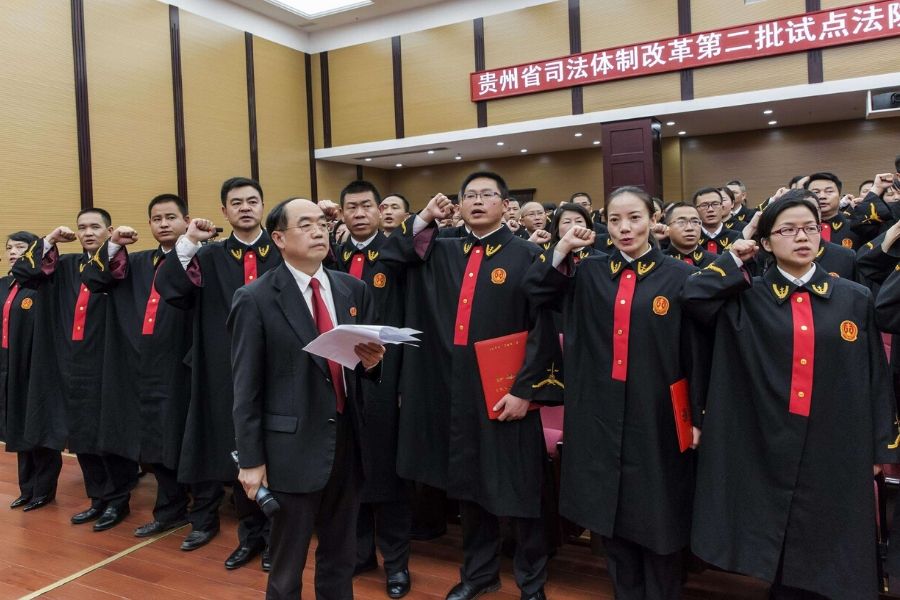
Law graduates, public civil servants, staff members of the Communist Party of China (CPC) and veterans are the main sources of candidates for judges in China.
The ongoing judicial reform of Chinese courts is trying to establish a new system for the election of judges. Before the new system is completed, the judges in China currently still come mainly from the aforementioned sources. We will have a special post on the new selection system later, but in this post, we will introduce judges from the aforementioned sources.
1. Public Civil Servants and the CPC Staff, Who Usually Hold Leadership Positions in Courts
Prior to serving in the courts, these people are usually the leaders of government departments or the CPC organs. They come to the courts mainly to serve as presidents, vice-presidents and other leadership positions in the courts. To explain this phenomenon, we need to understand the local political power structure in China.
China's political power can be roughly divided into four levels from the central to local, namely, the central authority, provinces, cities, districts and counties. Each level has its own CPC organization (i.e. CPC Committee), government and courts.
The election of the court presidents at each level is decided by the CPC Committee of the higher level. To be more specific, as for the president of the intermediate court of a city, the election is decided by the CPC Committee of the province where a candidate is located. By contrast, the vice presidents of the courts at each level and the heads of the courts' internal departments are determined by the CPC Committees at the same level. For example, the vice presidents of the intermediate court of a city are chosen by the CPC Committees of the same city.
After the CPC decides on the candidates for the court leadership, according to the Constitution, the people's congress at the same level as the courts will elect or appoint them.
This means, on the one hand, that the CPC controls the election of court leaders, and on the other hand, that there is a certain balance between authority at the higher level and authority itself in the decision-making power of the election of court leaders.
When the CPC chooses the court president, it does not necessarily select from the court's internal personnel, more often, it also selects from the government departments and inner-party organs. Therefore, if we look at the curriculum vitae of many Chinese court presidents, we will find that they often did not work in the courts before assuming the post.
2. Law Graduates, Who Usually Serve as Ordinary Judges
Following the enactment of the Law on Judges in China in 2001, judges are required to pass the National Judicial Examination (similar to the bar exam). Usually, most of the people who pass the exam are law graduates. As a result, in the past decade, law graduates have gradually become the main source of judges.
In most courts, graduates enter the courts in this way:
(1) Judicial Examination: After graduating from a law school and obtaining a bachelor's or master's degree, he/she has passed the Judicial Examination.
(2) Employment Examination: He/she has participated in the employment examination organized by the courts. In most cases, the exam questions of the employment examination are basically the same as those of the government departments in recruiting civil servants, which do not reflect the special needs of the courts.
(3) Serving as Law Clerks: Graduates who pass the employment examination will first serve as law clerks of the courts. Generally speaking, law clerks are divided into two types, one is those who are recruited through the aforementioned examinations and are likely to become judges in the future. Law clerks of this type are actually apprentices of judges. The other is those who are hired only as law clerks in the literal sense, with a less strict hiring process and lower requirements, and will not normally have the opportunity to become judges in the future. The law clerks in this post refer to the former.
(4) Apprenticeship: Law clerks provide all kinds of assistant work for judges and learn the skills essential for judges during the apprenticeship. Typically, law clerks are fixed to assist one or more judges and are regarded as apprentices of these judges.
(5) Acting as Assistant Judges: After several years' work (usually at least three years), with the approval of the CPC organization (i,e. CPC Group) in a court, law clerks are appointed as assistant judges by the court president. The CPC Group in a court is usually composed of the court president, the vice presidents, the director of the Political Department (in charge of personnel), and the director of the discipline inspection (in charge of inner-party discipline).
Assistant judges are the lowest-ranking judges, who can temporarily act as judges and serve as members of the collegial panel (except the presiding judge of the collegial panel). Graduates who have been promoted from law clerks to assistant judges will be able to hear cases formally. The assistant judges can be further promoted to the judges, namely, the regular judges. Assistant judges are appointed by the court president, while judges need to be appointed by the people's congress at the same level.
Since most courts require that law clerks not exceed a certain age (e.g. thirty) when recruiting them, this results in the fact that most law clerks actually enter the courts just after graduation from law schools, which leads to two phenomena: first, judges are generally very young, for example, the average age of judges in many primary courts is only over thirty; second, most judges have no other professional experience before, in other words, they enter the courts directly from law schools. Consequently, many judges may not have a deep understanding of the facts and background of a case.
3. Veterans, Who Are Already Rare in Chinese Courts
Before 2000, Chinese government organs, judicial organs, and the CPC organizations usually accepted veterans (usually military officers) and assigned certain positions to them, and the courts also did the same. In the 1990s, the phenomenon of "veterans entering the courts"(退伍軍人進法院) was criticized by the legal profession community of China and caused a wide range of debate. Since the promulgation of the new Law on Judges in 2001, this phenomenon has gradually decreased because most veterans cannot pass the Judicial Examination. Today, nevertheless, in many local courts, a small number of veterans can be seen holding other non-judge positions.
4.Conclusion
These above-mentioned three types of people constitute the current personnel structure of Chinese judges. Although Chinese courts are adjusting the system for the election of judges, the sources of personnel, especially the first and second sources, should not change much. What will change is the way in which these people become judges.
References:
[1] 劉忠.條條與塊塊關系下的法院院長產生[J].環球法律評論,2012,34(01):107-125.
[2] 左衛民.中國法官任用機制:基于理念的初步評析[J].現代法學,2010,32(05):43-51.
[3] 王少軍.法官選任制度改革調查研究[J].法制與社會,2015(36):42-43.
[4] 劉蘭. 中國法官任用運行機制研究[D].四川大學,2005.
Contributors: Guodong Du 杜國棟 , Meng Yu 余萌









